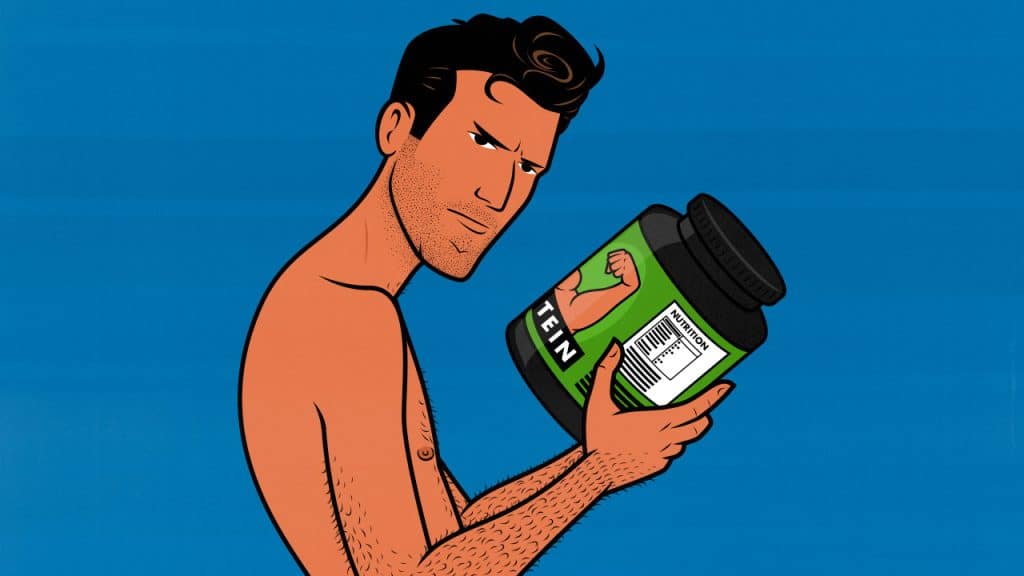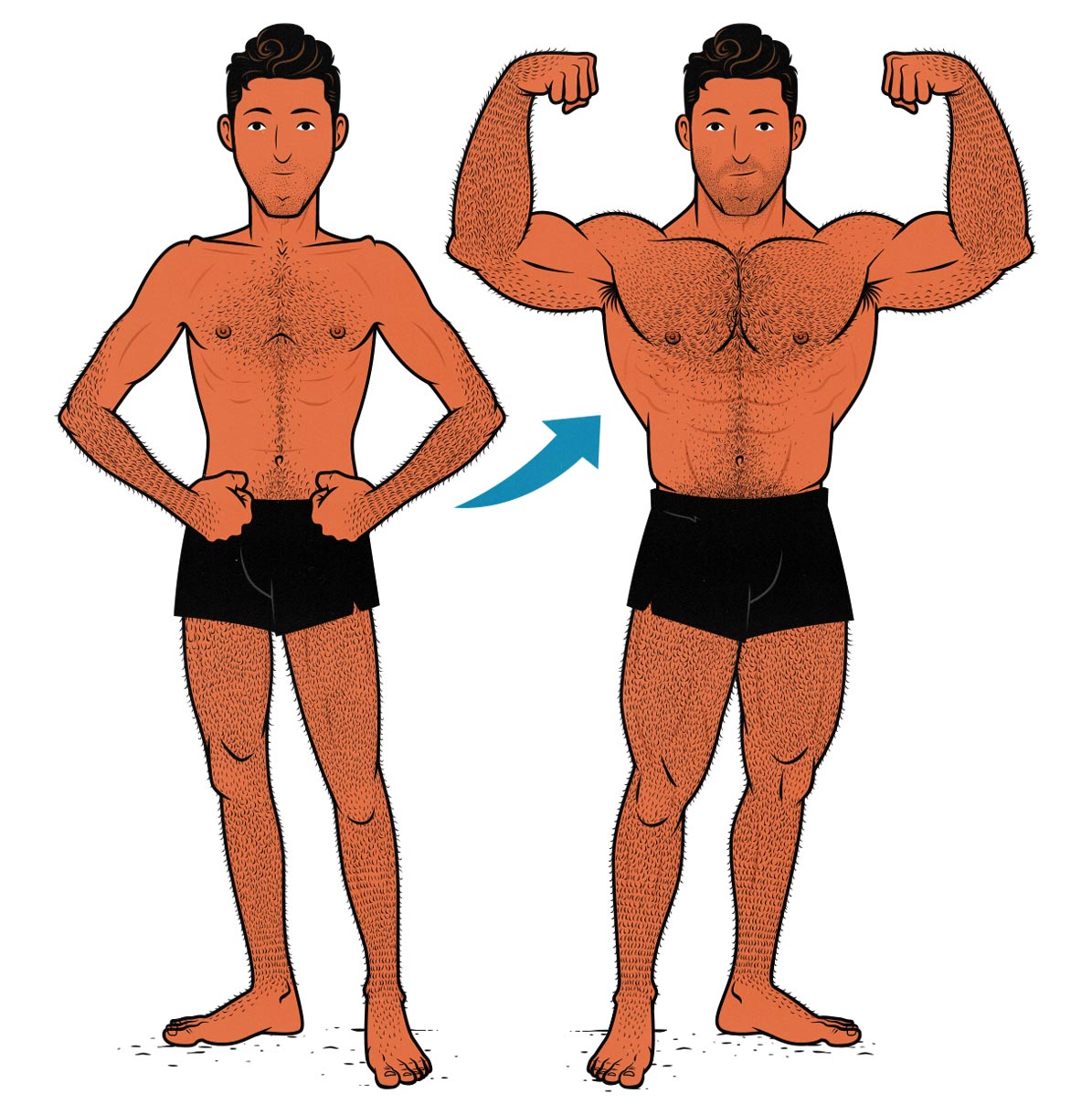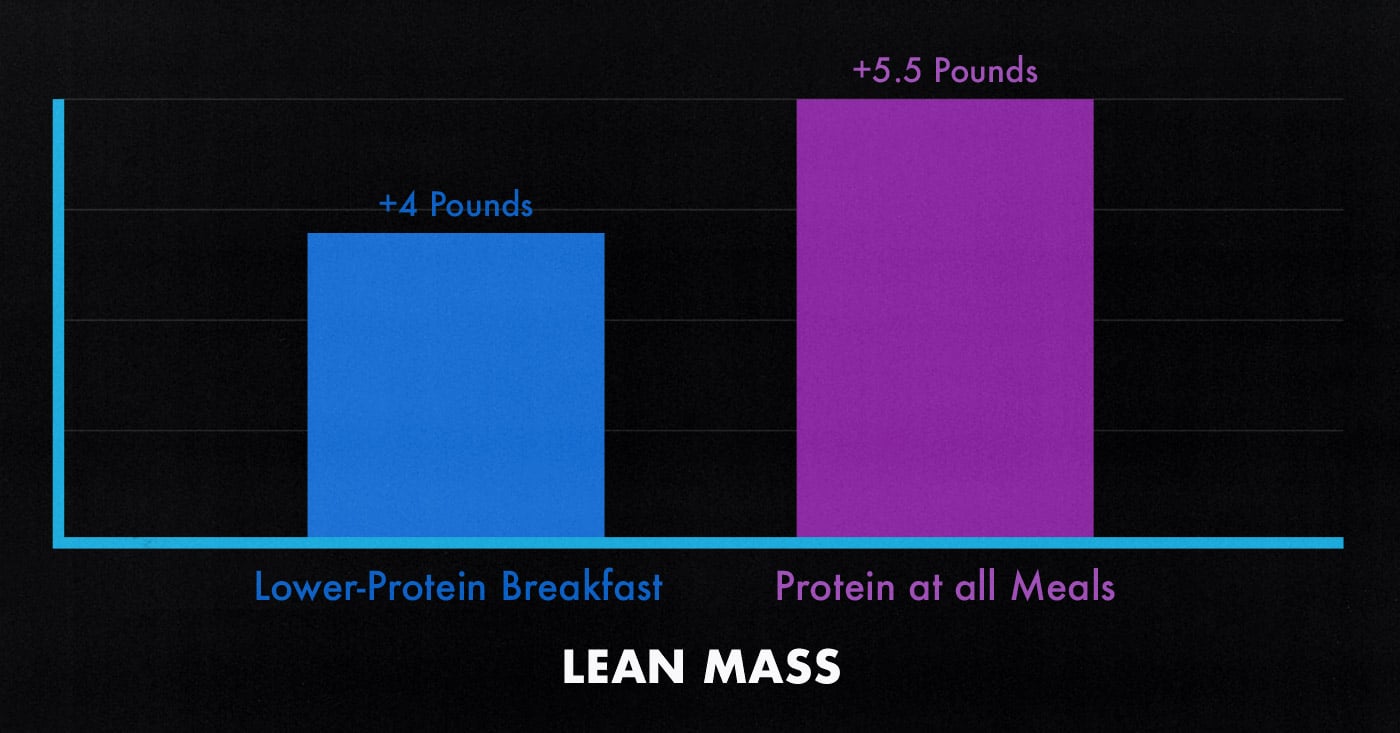
How Much Protein Should You Eat at Breakfast to Build Muscle?
There are two recent studies that I found interesting. The first looked at whether going from a low-protein breakfast to a moderate-protein breakfast would improve muscle growth. The second looked at the effects of going from a moderate amount of protein to a massive amount of protein.
If we look at both studies, we get a pretty good idea of how much protein you should eat at breakfast.

25+ Grams of Protein at Breakfast Improves Muscle Growth
Yasuda and colleagues compared the effects of eating around 8 versus 23 grams of protein at breakfast while following a muscle-building workout routine (study). Both groups ate the same amount of protein overall. The only difference was how much of that protein they ate at breakfast.

The group who ate more protein at breakfast gained 37% more muscle. They also gained more strength. This suggests you ought to eat at least 23 grams of protein with breakfast, especially if you’re training to build muscle.
However, to maximize your rate of muscle growth, you need to eat at least 0.7 grams of protein per pound of body weight per day. If you weigh 150 pounds, that’s 105 grams of protein. Unless you’re eating 6 meals per day, you might need to eat more than 23 grams of protein per meal. That’s where the next study comes in.
100+ Grams of Protein Could Be Even Better
Jorn Trommelen led a new study on protein timing, finding that 100 grams of protein per meal stimulated more muscle-protein synthesis than 25 grams per meal. This suggests you can benefit from eating more than 25 grams of protein at breakfast.
There’s another way to look at it, though. If you want to eat the bare minimum amount of protein at breakfast (around 25 grams), you can probably at least somewhat make up for that by eating more protein later in the day. After all, you only need to make it to 0.7–1 gram of protein per pound of body weight per day. Eating more protein than that won’t improve muscle growth. That gives you at least a little bit of freedom with how you spread it out between meals.
I should also point out that older research found that muscle-protein synthesis started to see diminishing returns at 20 grams per meal and plateau at 40 grams of protein per meal. There’s no harm in eating more, and your body will certainly use all of the protein you eat—for energy if nothing else—but I think you can get most of the benefit with as little as 25 grams.
What About Intermittent Fasting?
The most popular form of intermittent fasting involves skipping breakfast. Obviously, if you’re eating nothing at all, you’re getting 0 grams of protein for breakfast. That sounds like it would doom intermittent fasters to a pitiful life of suboptimal muscle growth, but that doesn’t seem to be the case.
Intermittent fasting seems to be okay for building muscle. The research is somewhat mixed (full breakdown here). Some studies show worse muscle growth. Other studies show comparable amounts of muscle growth. The main problem is that eating fewer meals can make it much harder to get into a calorie surplus, limiting the amount of muscle you can build.
If you’re already having a hard time eating enough calories to build muscle, skipping breakfast will only make that harder. If you’re able to eat enough calories, intermittent fasting isn’t too bad. You can make up for eating fewer meals by eating more protein per meal. For example, if you’re trying to get 105 grams of protein in three meals, that’s 35 grams per meal.
If you want to fully optimize your bulking diet for muscle growth, it’s probably wise to spread your meals throughout the day, eating breakfast soon after waking up and having a snack shortly before going to bed.
Conclusion
We usually recommend eating a few balanced bulking meals per day, with each of those meals containing at least a moderate amount of protein. 20–25 grams makes for a good minimum. Don’t overprioritize protein or timing, though. The most important thing is to eat a nutritious diet that gives you enough calories to grow.

Breakfast is a great time to get ahead on your calories, and it might be a good opportunity to get ahead on your protein, too. Feel free to eat 40, 60, or even 100 grams of protein at breakfast. Personally, I aim for at least 20 grams but usually get closer to 40. Bulking smoothies make that easy.
The other advantage to eating a bigger breakfast is that it saves you from having to eat larger meals later at night. Digesting large meals deep into the night can raise your body temperature, making it harder to fall into a restful slumber (more on that here). So, if you can, I’d go bigger with breakfast.

Alright, that’s it for now. If you want more muscle-building information, we have a free muscle-building newsletter. Or, if you want us to walk you through the entire process of bulking up, check out our Bony to Beastly Program. It includes a customizable workout routine, a bulking diet guide, a recipe book, and support from us in our online community.
We’ll help you get started, track your progress, answer all your questions, and give you feedback as you go through the program. Your results are fully guaranteed. We have an unconditional refund policy.

